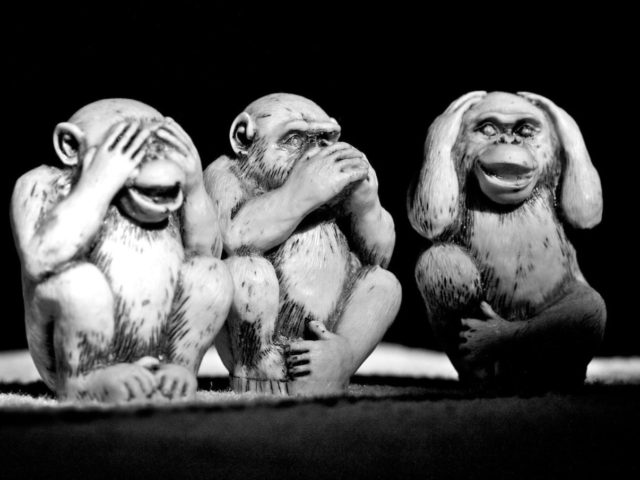Academics at the University of York removed a depiction of the three wise monkeys from their website after they determined it could be seen as an insult to ethnic minorities.
The Three Wise Monkeys, which embody the Japanese proverb “see no evil, hear no evil, speak no evil” and are often used to describe those turning a blind eye to wrongdoing, have become the latest victims of the Black Lives Matter iconoclastic movement in the United Kingdom.
The organisers of an upcoming art history conference at the University of York in England have apologised for their use of the three monkeys in their call for submissions and removed it from their website.
“Upon reflection, we strongly believe that our first poster is not appropriate as its iconology promulgates a longstanding visual legacy of oppression and exploits racist stereotypes,” the organisers wrote in comments reported by The Times.
“We bring this to your attention, so that we may be held accountable for our actions and, in our privileges, do and be better.”
Experts in Japanese history and culture were shocked by the academics insistence on likening the three monkeys to racist iconography.
The former curator of the British Museum’s Japanese collections, Tim Clark, said that he had “no idea” why they would be seen as offensive.
An expert in Japanese Buddhism, Dr Lucia Dolce, said that monkeys have a positive connotation in Japan and that monkeys would not be used to insult other cultures “because the monkey is a sacred being. They are vehicles of the deities.”
Student Union Leader: Whites Should Stay Home Unless They're 'Poor, Disabled, Gay, or Transgender' https://t.co/HJQHWfYGPE
— Breitbart London (@BreitbartLondon) September 6, 2020
A spokeswoman for the University of York defended the decision, saying: “The Japanese symbol of the three wise monkeys was used to represent a postgraduate conference about the sensory experiences of the body, and it also appeared on a document that asked for submission of research papers to the conference on a range of areas, one of which included papers that represented black, indigenous and people of colour.”
“It was considered… that a monkey, which has been used in a derogatory way in the past, could cause offence in this context, despite this not being the intention of the organisers, so the image was removed,” she went on.
The Three Wise Monkeys were first embroiled in controversy in Britain in 2007, when four Unison activists used the image to mock the leadership of the union for turning a blind eye to the issues raised by the rank and file.
The left-wing union attempted to claim that the joke was racist as one of the leaders of the union was black, but an employment tribunal dismissed the case as it was determined that no reasonable person would conclude that the Japanese symbol had racial connotations.
Political commentator Calvin Robinson, who himself has been a target of racial abuse from left-wing activists, said: “In Japanese culture, the monkeys are seen as sacred beings with positive connotations.”
“I can’t help but feel like the only racism here is the assumption of York University’s academics,” Robinson added.
Elite English Girls' School Goes Woke, Rewrites 'White Western Narrative' of History Lessons https://t.co/wyjAIwepoJ
— Breitbart London (@BreitbartLondon) December 13, 2020
Follow Kurt Zindulka on Twitter here @KurtZindulka

COMMENTS
Please let us know if you're having issues with commenting.